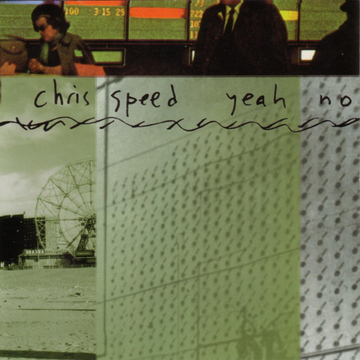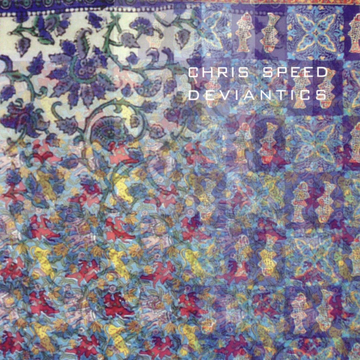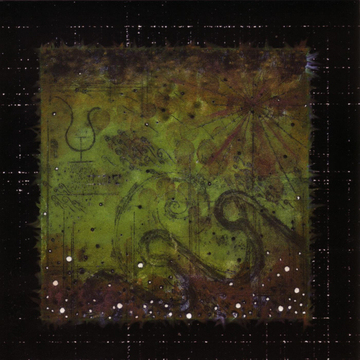Chris Speed
Yeah No
SGL 1517-2“Speed’s music is one of the freshest and most attractive newer strains in jazz — moving, driving, blending, shaking and evapoating in glassy plumes…And what a quartet…Speed himself flows subtly through moods ranging from static drift to Baklan whirl…Emphatically recommended.”
— Greg Burk, L.A. Weekly
Chris Speed’s first CD as a leader is an extension of his work with Human Feel and Tim Berne’s Bloodcount, and reveals an alternative approach to making jazz today. The music was conceived out of improvisation: no repertoire, no hierarchy, just whatever the band created on its own. After transcribing hours of these jams, Speed finally brought in his compositions: “We had an organic and unique sound happening as well as a democratic space from which to approach the tunes. Then I felt I could organize more specifically what I wanted, because the band itself was the source of my compositions.” Speed draws on contemporary classical and Balkan forms as well as jazz and groove-based styles for his themes and rhythms. There’s a subtle, simmering kind of freedom to much of this music but the range is wide, from joyful splurges of free jazz (“Scribble Bliss”) to explorations of texture (“The Dream and Memory Store”), variations on collective improvisation (the ironically-named “Not an Option”), and folk jazz in a crooked time zone of eleven (“Merge”). “I wanted to make a jazz record where everyone felt free to push the boundaries beyond the typical roles, and still sound like a collective voice; it’s pretty clear that we all trust each other and feel comfortable enough to really improvise, which basically is the point of all this anyway.”
Bio-wise, Chris writes: “Born in Seattle…raised on ‘classical’ music, performing on both clarinet and piano…bitten by jazz and the tenor sax in high school…later seduced by Eastern European ‘folk’ music…served penance in Boston at New England Conservatory and escaped to NYC in 1992.’ He has since worked with Anthony Braxton, John Zorn (Bar Kokhba, Tzadik), Mark Helias, Dave Douglas (In Our Lifetime, New World, and Sanctuary, Avant), Michael Formanek (Nature of the Beast, Enja), Orange Then Blue (While You Were Out, GM), and is currently touring and recording with Tim Berne (Memory Select, Poisoned Minds, and Lowlife, JMT, and Unwound, 3-CD set, Screwgun), Myra Melford (The Same River, Twice, Gramavision), Erik Friedlander (Chimera, Avant, and The Watchman, Tzadik), Mark Dresser, Ben Perowsky, Briggan Krauss (Good Kitty, Knitting Factory), and the coop groups Pachora (Knitting Factory) and Human Feel (Human Feel and Scatter, GM, Welcome to Malpesta, New World, and Speak to It, Songlines). Chris received an NEA composition grant in 1994 for which he composed a piece dedicated to Albert Ayler.
Cuong Vu plays/records with Dave Douglas’ Sanctuary (Avant), Bobby Previte (Too Close to the Pole, Enja), Orange Then Blue (While You Were Out), Andy Laster (Interpretations of Lessness, Songlines), and Mark Helias. He leads the group Punk and the Junk in his Brain, and co-leads Saft/Vu (Ragged Jack, Avant) with Jamie Saft.
Skuli Sverrisson has appeared on over 30 records with Icelandic artists, including his group Pax Vobis, and with Mo Boma (formed with Carsten Tiedemann). He tours and records with Allan Holdsworth (Hard Hat Area, Cream), and has appeared with Leo Smith, Derek Bailey, Peter Brotzmann, and Tim Berne, collaborated with Arto Lindsay, Towa Tei and Peter Scherer, and currently plays with Pachora, Erik Friedlander and Gregg Bendian. He and Jim Black are on the just-released Theo Bleckmann/Ben Monder CD No Boat (Songlines). His first solo record (Sermonie, Extreme) features tape compositions showing his interest in electronics and extended techniques of his instrument.
Jim Black grew up in Seattle, moved to Boston (he and Chris were founding members of Human Feel in 1987), then to NYC in 1991. He has toured and/or recorded widely, including with Bloodcount, Dave Douglas’s Tiny Bell Trio (Songlines, hatART and Arabesque), Ellery Eskelin (Songlines and hatART), Ben Monder (Songlines), Saft/Vu (Avant), Michael Formanek (Enja), Ned Rothenberg (Moers), and Ed Schuller (Tutu). Recently he has worked with Mark Dresser, Ray Anderson, Kenny Wheeler, Tomasz Stanko, Lee Konitz, and Dewey Redman. A founding member of Pachora, his own quartet includes Speed, Anthony Coleman and Tony Scherr.
Writers Choice 1997, Steve Vickery, Coda
“…a crucial newer voice doing what he does with fire, soul and a big brain.” — Spike Taylor, Exclaim!
“With equal parts rhapsodic lyricism, compositional integrity, and freak-jazz freedom Speed’s quartet delivers invigorating new music which hints at the shape of jazz to come.” — Trey Hatch, The Stranger
“At the heart of Speed’s band is the near-telepathic rapport the saxophonist shares with drummer Jim Black…Yeah No has a coherence that many improvisationally oriented discs lack, yet each tune is a passport into a unique sonic world. Whether playing Balkan-influenced stomps or hallucinatory soundscapes, the musicians bring Speed’s concepts to beautiful life…Speed’s keen grasp of structure combined with his emotional approach to his horn makes what is often thought of as ‘difficult’ music seem simply intelligent and adventurous.” — Alexander Varty, The Georgia Straight
“Using close phrasing and a serrated tone, Speed can project a nearly classical restraint and precision…Yet, while the vocabulary may not be blues based the feeling conveyed speaks in a distinctive delta blues patois…Modern impressionist gutbucket…” — Joseph Murphy, 5/4 Magazine
“Speed’s sound still snakes amid Vu’s trumpet, cradled in the curvature of harmony and then crossing it like a discordant X-factor only seconds later…But his new ensemble digs in soulfully and trades solos in the spirit of Ornette Coleman’s early quartet and even the Baroque romanticist jazz of Gerry Mulligan and Chet Baker…The search has long been on for the killer next generation of jazz that will charge up the contemporary indie/alt-rock and DJ scenes, but Yeah No points to a spot where listeners can converge. And when they meet, they’ll be swinging their hips, or just head-tripping through the band’s extended, harmonic tone poems and ambient extremities.” — Andrew Bartlett, Seattle Weekly
“Speed’s music spreads and swirls like kyrilloscopic screens into novel textures, tones, and spaces. — Fred Bouchard, CD Review
“Speed has long been making intelligent tenor sax contributions to various NY-based groups. In both his writing and his playing he favours long, repetitive lines, with a breathy tone and an ear open to rock and Arabic music. Cuong Vu makes an imaginative and quirky companion…Intriguing stuff.” — Will Montgomery, The Wire


